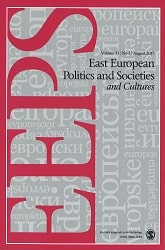The Domestic Politics of Protecting Human Rights in Counter-Terrorism: Poland’s, Lithuania’s, and Romania’s Secret Detention Centers and Other East European Collaboration in Extraordinary Rendition
The Domestic Politics of Protecting Human Rights in Counter-Terrorism: Poland’s, Lithuania’s, and Romania’s Secret Detention Centers and Other East European Collaboration in Extraordinary Rendition
Author(s): Henry Frank CareySubject(s): Human Rights and Humanitarian Law, Government/Political systems, Security and defense, Politics and law
Published by: SAGE Publications Ltd
Keywords: human rights; Poland; Romania; Lithuania;
Summary/Abstract: Three countries in Eastern Europe, Poland, Lithuania, and Romania, hosted secret detention sites for the benefit of the Central Intelligence Agency’s (CIA’s) interrogation program from about 2002 to 2006. All three countries initially denied with indignation these allegations. In the past five years, Poland moved toward prosecution as a result of a Supreme Court decision ordering declassification of documents, which resulted since 2008 in an ongoing prosecutorial investigation likely to indict the former Interior Minister and possibly others. While Lithuania’s parliament identified plans for a site, it claimed to not know whether it was used, and prosecution was aborted. Romania’s secret prison became the host not only to second-tier, high-value detainees of the CIA, but after Poland shut down its site, to the most dangerous detainees, who were tortured in the basement of the National Security Archives Building in Bucharest. Romania’s three governmental branches continue to deny that it ever collaborated with the CIA or that such a site even existed. This essay analyzes this variation in the domestic responses of these three countries, as well as other CIA collaborations with Bosnia, Kosovo, and Macedonia. It argues that international pressure was a necessary condition for domestic political processes, especially in the legislative and judicial branches supervising executive actions. However, the strength of the latter two branches, along with the type of political class and civil society, will explain the strongest reform process in Poland, the medium-range response in Lithuania, and the nonresponse of denial by Romania.
Journal: East European Politics and Societies
- Issue Year: 27/2013
- Issue No: 03
- Page Range: 429-465
- Page Count: 37
- Language: English
- Content File-PDF

